Reform, Revolt and Revolution in Egypt and the Arab World
Lisa Anderson, President of The American University in Cairo
Photos | Transcript
 Washington, DC—On July 10, 2012, Lisa Anderson, president of The American University in Cairo, discussed "Reform, Revolt and Revolution in Egypt and the Arab World" at a Beyond the Headlines event at the Embassy of Slovenia. Her talk compared the revolutions in Egypt, Tunisia and Libya and established a framework for the transformations in the Middle East, focusing on the implications of President Morsi's recent election for Egypt, the region and the US.
Washington, DC—On July 10, 2012, Lisa Anderson, president of The American University in Cairo, discussed "Reform, Revolt and Revolution in Egypt and the Arab World" at a Beyond the Headlines event at the Embassy of Slovenia. Her talk compared the revolutions in Egypt, Tunisia and Libya and established a framework for the transformations in the Middle East, focusing on the implications of President Morsi's recent election for Egypt, the region and the US.
In her remarks, Anderson explored the differences between these revolutions and declared "I am fundamentally optimistic about changes that have taken place in Tunisia, Libya and Egypt." Anderson defined the three levels of government political organization—incumbent, regime, and state—to compare the unique nature of each revolution. She contrasted the regime change in Tunisia from police rule to democracy with the more complicated Libyan revolution that threatened the state itself. In Egypt, the military facilitated Mubarak's overthrow in an attempt to save the regime, sparking tension between the military generals and democratically-elected civilian leadership. She explained that both military and political officials are currently "testing the limits" of their authority as the civilian government seeks to reinstate the democratically-elected parliament that was disbanded by the Supreme Constitutional Court in early June.
Anderson notes that President Morsi's initial moves as president were "politically very adroit" in his attempts to balance competing interest groups within Egypt. The new president is caught between appeasing the Islamic electorate and the military generals, who are currently "testing the limits of their authority" within the public sphere. Morsi acknowledged the revolutionaries during an unofficial inauguration ceremony in Tahrir Square, but was later sworn in by the Mubarak-appointed Supreme Court judges in an attempt to satisfy his diverse constituents and determine his allies. He also reconvened the Islamist-dominated parliament, which was democratically elected but dissolved by the Supreme Constitutional Court in early June. Anderson asserted that the Muslim Brotherhood, in its transition from a banned political group to leading political party, cannot solely rely on the "Islam is the solution" platform of its past. She believes that in future elections, we will see new campaign rhetoric and promises to which Egyptians can hold their elected officials accountable.
In reference to American–Egyptian relations, Anderson commended the Obama Administration for its efforts to keep the spotlight on Egypt and for acknowledging that this revolution was not about the US. The US will need to adjust its foreign policy to make negotiations with Egypt as a state, regardless of the president in power, as Egypt will continue to look to the United States for economic aid. Anderson believes that national interest, rather than foreign affairs, will be the priority of the Morsi government as he works to restore a flailing economy in a volatile society. Anderson notes that "most Egyptians aren't paying much attention to the United States" and that "much of the issues of foreign policy are of no consequence to Egyptians" as they are primarily focused on basic improvements such as improving schools, job opportunities and affordable housing. Anderson also negated the common American perception that Islam poses the greatest challenge to Egypt, when in reality the most pressing issue is whether "the military will concede space to civilian policymakers."
Many women's rights activists are nervous about the stark contrast between former First Lady Suzanne Mubarak and President Morsi's wife, Um Ahmed. The initiatives that Mrs. Mubarak implemented from the top-down to enhance gender equality in Egypt, such as the National Council for Women and the quota for women in parliament, were disbanded when Mubarak was driven out of power. The new first lady has expressed her disdain for politics and plans to remain uninvolved in the women's rights movement. Anderson stated that as the market becomes more important than the public sector, as was the case with the collapse of communism, states shrink and women have less access to positions of public authority. She predicted that we are likely to see similar patterns in Egypt and Tunisia with the current emphasis on the economy. Because Um Ahmed will not lead the women's movement, activists must utilize new strategies in order to make their voices heard. Anderson hopes that because more women are obtaining university degrees in Egypt, pressure on the job market over time will allow women to obtain positions in the private sector.
Though Anderson claims that Egypt already has a "robust" civil society, she asserts that we will continue to see a growth in "apolitical citizenship" for Egyptians. There is unlikely to be space for American-funded civil society groups, but ultimately, Anderson believes that human rights advocacy organizations will continue to flourish in Egypt and will be important in reform.
Anderson stated that the events in Egypt were "not just a revolution of rights, but a revolution of responsibility" and described the transition as Egyptians develop opinions about public affairs for the first time. In an anecdotal story about one of her bodyguards, Anderson noted "in 18 months, he went from not having an opinion, to knowing that he hadn't had an opinion, and to having fairly well articulated opinions about public affairs." This personal anecdote revealed not only the challenges of the political transition and the public responsibility, but also her optimism that these changes will improve society and achieve the goals of the revolution.
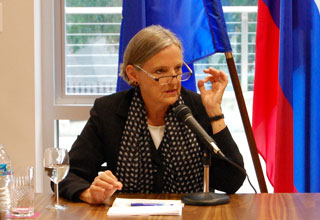 |
 |
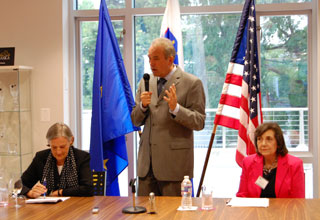 |
Lisa Anderson speaks to guests
|
|
Ambassador Roman Kirn of Slovenia welcomes guests
|
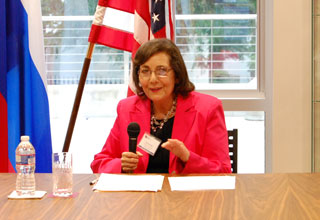 |
 |
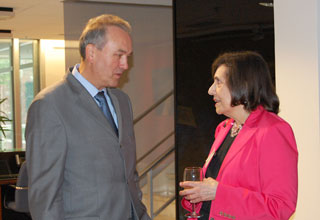 |
WFPG President Patricia Ellis opens the program
|
|
Patricia Ellis and Ambassador Kirn
|
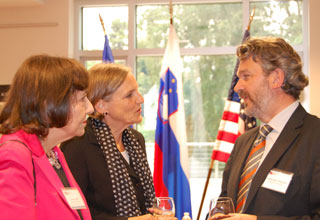 |
 |
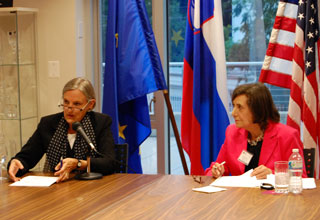 |
Ambassador Joško Paro of Croatia speaking with
Patricia Ellis and Lisa Anderson
|
|
Lisa Anderson answering a question
from the audience
|
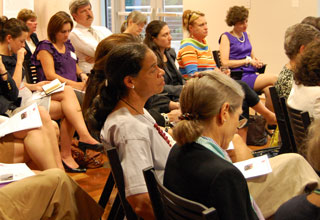 |
 |
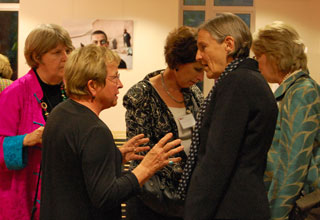 |
| |
|
|
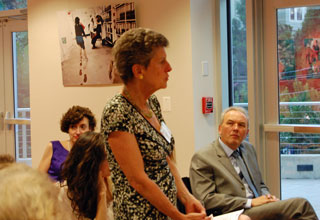 |
 |
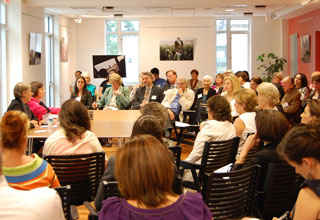 |
| |
|
|
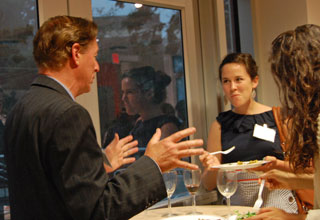 |
 |
 |